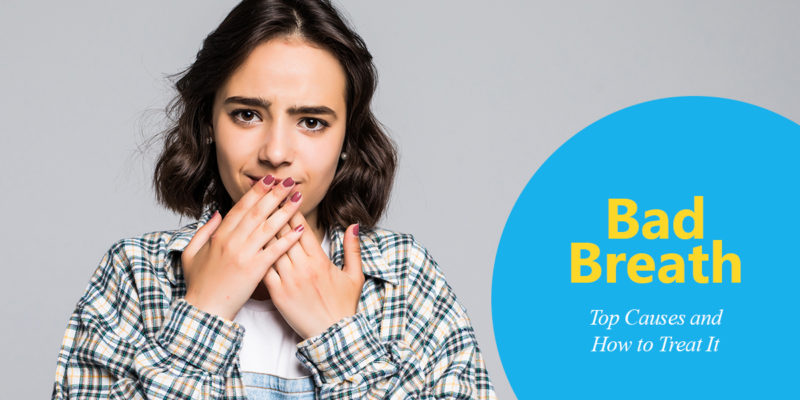
Bad breath is common among all people. But when “morning breath” becomes chronic and cannot be fixed by simple brushing, mouthwash, or mints, it might be something more serious. Halitosis affect 1 out of 4 people. It is also the third most common reason why people seek dental care, next to tooth decay and gum disease.
Causes of Bad Breath
- Poor Dental Hygiene
If you do not brush or floss daily, some food particles that stay in your mouth produces odor and bacterial growth between teeth, gums, and tongue. Plaque build-up is also caused by not properly and regularly brushing your teeth. - Food
Generally, food particles that are not removed from the teeth causes odor. Some foods with strong odors, such as onions and garlic, causes bad breath also. - Tobacco
Ever talk to someone and initially smell their cigarette breath? Tobacco produces its own kind of mouth odor. In the long run, these can cause more serious dental problems like gum disease. - Diseases
Xerostomia when the mouth is naturally dry, Gastroesophageal Reflux Disease (GERD), some forms of cancer, liver failure, respiratory tract infections, and other metabolic diseases. Sometimes, bacteria-covered stones can form on the tonsils at the back of the throat and produce odor.
How can you prevent bad breath?
- Good Oral Hygiene. Practice brushing twice a day with a toothpaste that contains fluoride to remove plaque and food debris in your teeth. Use your toothbrush’s bristles or the tongue cleaner on the back, if it has one, to brush your tongue. It is also a good practice to replace your toothbrush every 2 to 3 months, or after an illness. Do not forget to floss daily to remove plaque and food stuck between your teeth, and rinse with an anti-bacterial mouthwash. If you find flossing difficult, alternatives like pixters, floss handles, and water flossers can make it easier.
- Regular dental visits. See your dentist every after 6 months so they can conduct an oral exam and professional teeth cleaning. This can help prevent diseases from happening by early detection.
- Stop smoking. Smoking or chewing tobacco-based products need to go if you’re serious in fighting Halitosis. Ask your dentist for tips on how to kick this habit.
- Water, water, water. Drink lots of water to keep your mouth moist. Chewing gum or sucking candies (preferably sugarless) will also stimulate the production of saliva that helps wash away food particles and bacteria.
- Log your food. If you think your food is the culprit behind Halitosis, log the foods that you eat and bring it to your dentist to review. Include your medications in this list as some drugs can create mouth odours.
Who treats bad breath?
Dentists can detect and treat causes of bad breath. However, if your dentist determines that your mouth is healthy and does not detect the direct cause of odour, you may be referred to a family doctor or a specialist.
In need of our help?
Want a dentist who can check your Halitosis? Set an appointment with us today!
Cardiff
Phone: (02) 4954 7722
Email: cardiff@msdental.com.au
Open Hours: Monday-Friday 9:00 AM – 5:30 PM, Saturday 9:00 AM – 4:00 PM
Follow Us on Facebook: @msdentalcardiff
Singleton
Phone: (02) 6572 2526
Email: singleton@msdental.com.au
Open Hours: Monday – Friday 9:00 AM – 5:30PM
Follow Us on Facebook: @msdentalsingleton
Fletcher
Phone: (02) 4953 8614
Email: fletcher@msdental.com.au
Open Hours: Monday – Friday 9:00 AM – 5:30 PM
Follow Us on Facebook: @msdentalfletcher
















Leave a Reply